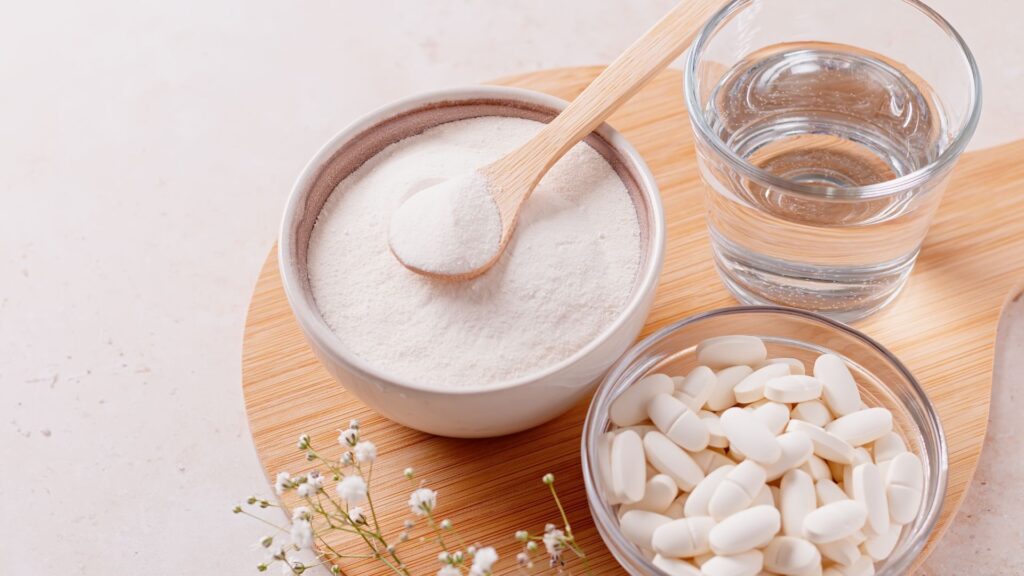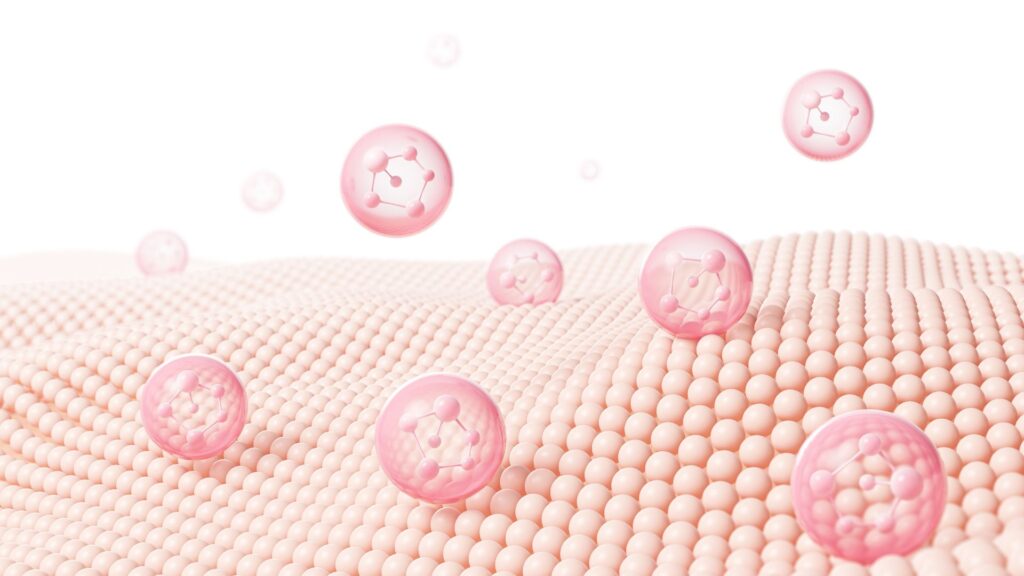|
Getting your Trinity Audio player ready...
|
Collagen peptides have garnered significant attention in the health and wellness sphere, primarily due to their potential benefits in maintaining the structural integrity of the body. Hence, it is crucial to understand the implications of incorporating these bioactive peptides into the diet. This article will explore the various ways to include collagen peptides in one’s diet and discuss the potential health benefits they offer.
Understanding Collagen and Its Importance in Diet
Definition of Collagen and Collagen Peptides
Collagen is the most abundant protein in the human body, forming a major component of connective tissues that make up several body parts, including tendons, ligaments, skin, and muscles. Collagen peptides, also known as hydrolyzed collagen, are small bioactive peptides obtained by enzymatic hydrolysis of collagen. They are more easily digestible and are believed to be absorbed more efficiently into the bloodstream due to their shorter amino acid chains.
Role of Collagen in Body’s Structural Composition
In the body, collagen acts as a scaffold, providing strength and structure. It aids in the maintenance of skin elasticity, joint mobility, and the integrity of cartilage, which is essential for joint health. The aging process naturally depletes the body’s collagen stores, making supplementation a topic of interest for maintaining optimal health.
Benefits of Collagen Supplementation
Supplementation with collagen peptides has been associated with a range of health benefits. Research suggests that it may improve skin health by reducing wrinkles and dryness. In the realm of joint health, studies indicate that collagen supplements may help relieve joint pain and symptoms of osteoarthritis. Additionally, collagen supplementation may promote muscle mass in people with sarcopenia, the loss of muscle mass due to aging, and contribute to heart health by providing structure to arteries and vessels.

Sources of Collagen in Diet
Food Containing Collagen
Collagen is naturally found in the connective tissues of animals. Therefore, foods rich in collagen tend to be those derived from animal sources. Bone broth, made by simmering bones for an extended period, is particularly rich in collagen and has been consumed for its health benefits for centuries. Other dietary sources include meats with connective tissues, such as chicken skin, pork skin, and beef shanks, as well as fish and shellfish.
Collagen Supplements
For those looking to increase their collagen intake, supplements are a convenient option. Collagen supplements come in various forms, including powders, capsules, and liquids. These products typically contain collagen peptides, which are believed to be more easily absorbed by the body. When selecting a collagen supplement, it is important to consider the source of the collagen, the type (I, II, or III, each associated with different benefits), and any additional ingredients that may be included.
How to Incorporate Collagen Peptides into Your Diet?
Adding Collagen Peptides to Meals
Collagen peptides are versatile and can be seamlessly integrated into a variety of dishes. Due to their neutral taste and high solubility, they can be mixed into both hot and cold recipes without altering the flavor. A common method is to stir collagen powder into soups, sauces, or stews, where it can dissolve and blend with the other ingredients.
Collagen Peptide Diet for Snacking
Snacks present another opportunity to enhance protein intake with collagen peptides. They can be incorporated into homemade protein bars, oatmeal, or yogurt, boosting the nutritional profile. For those who bake, collagen powder can be added to recipes for muffins, pancakes, or cookies to create a more nutrient-dense treat.
Smoothies and Beverages
Smoothies are a particularly popular way to include collagen peptides in one’s diet. A scoop of collagen powder can be added to any smoothie recipe, providing an effortless protein boost. Collagen can also be dissolved in beverages such as coffee, tea, or even water, making it an easy addition to daily routines.
Factors Influencing Collagen Digestibility and Effectiveness
Impact of Amino Acid Balance
The effectiveness of collagen peptides as a dietary supplement is influenced by their amino acid composition and balance. Collagen is particularly high in glycine, proline, and hydroxyproline, which are less abundant in muscle meats. This unique profile can complement a diet that is rich in muscle meat by providing a more balanced spectrum of amino acids.
Indispensable Amino Acid and PDCAAS Calculations
The Protein Digestibility-Corrected Amino Acid Score (PDCAAS) is a method of evaluating the protein quality based on both the amino acid requirements of humans and their ability to digest it. Collagen does not contain all nine indispensable amino acids and therefore does not have a complete PDCAAS score. However, when used in conjunction with other protein sources that supply these missing amino acids, collagen can help create a more complete amino acid profile in the diet.
Integrating Collagen Peptides with Other Healthy Lifestyle Habits
Incorporating collagen peptides into one’s diet is just one aspect of a holistic approach to health. To maximize the potential benefits of collagen, it should be part of an overall healthy lifestyle. This includes maintaining a balanced diet rich in fruits, vegetables, whole grains, and lean proteins, ensuring adequate hydration, getting regular physical activity, and managing stress.
Combining collagen supplementation with weight-bearing exercises can support bone health, while pairing it with strength training may enhance muscle mass and strength.

Boost Collagen Production Naturally
The body’s natural collagen production can be supported through diet and lifestyle choices. Nutrients that are essential for collagen synthesis include vitamin C, proline, glycine, and copper. Including foods rich in these nutrients, such as citrus fruits, berries, leafy greens, nuts, and shellfish, can help support the body’s collagen production.
Moreover, preventing the breakdown of existing collagen is equally important. Avoiding excessive sun exposure, refraining from smoking, and limiting the intake of sugar and refined carbs, which can damage collagen, are proactive measures to maintain the body’s collagen integrity.
Collagen Peptide Diet Specifics for Targeted Benefits
Tailoring collagen peptide intake to address specific health goals can enhance their benefits. For skin health, collagen peptides containing hyaluronic acid and vitamin C may be advantageous, as these ingredients are known to support skin hydration and collagen synthesis. For joint health, combining collagen with supplements like glucosamine and chondroitin may provide additional support.
For those interested in weight management, collagen peptides may promote satiety and help reduce overall calorie intake. Additionally, when aiming to improve muscle mass, collagen peptides can be taken post-exercise to support muscle recovery and growth.
It’s important to note that while collagen peptides can be beneficial, they should not replace a varied and balanced diet. The best approach is to use them as a complement to a diet rich in whole foods.
Final thoughts
To summarize, collagen peptides present an intriguing addition to the diet, offering a range of potential health benefits that align with the body’s natural processes. While they are not a cure-all, their ability to be easily incorporated into daily meals and snacks makes them a practical choice for those looking to support their health. It’s essential, however, to view collagen peptides as part of a broader health and wellness plan that includes a balanced diet, regular exercise, and other healthy lifestyle habits.

Disclaimer: Please note that many peptide therapies are not FDA-approved and their efficacy and safety have not been fully established. It is crucial to consult with your healthcare provider before starting any new supplements or treatments, including peptide therapy.
References
Linsenmayer, T. F. “Collagen.” In Cell Biology of Extracellular Matrix: Second Edition, pp. 7-44. Boston, MA: Springer US, 1991.
León-López, Arely, Alejandro Morales-Peñaloza, Víctor Manuel Martínez-Juárez, Apolonio Vargas-Torres, Dimitrios I. Zeugolis, and Gabriel Aguirre-Álvarez. “Hydrolyzed collagen—sources and applications.” Molecules 24, no. 22 (2019): 4031.
Zhao, Xiaocao, Xuejiao Zhang, and Dengyong Liu. “Collagen peptides and the related synthetic peptides: A review on improving skin health.” Journal of Functional Foods 86 (2021): 104680.
Bornstein, Paul, and Helene Sage. “Structurally distinct collagen types.” Annual review of biochemistry 49, no. 1 (1980): 957-1003.






